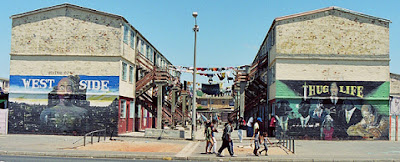As apartheid came to an end, it was Archbishop Desmond Tutu
that said “We chose to walk the path of reconciliation rather than revenge and
retribution”. With this President Nelson Mandela appointed Tutu as chair of
South Africa’s Truth and Reconciliation Commission with the purpose of
achieving peace and closure for a ravished country. I want to transition from
this idea to that of the Equitable Employment part of the BBBEE scorecard. This
states that a certain percentage of black employees in junior, middle and
senior management in company should be achieved in the upcoming years.
Likewise, by achieving high ratings on this scorecard, there are benefits. For
one, in the public sector the government has internal policies to only deal
with entities with a particular BBBEE score. Likewise, private companies
receive higher scores for dealing with other entities with high BBBEE scores.
 |
| Archbishop Desmond Tutu |
There is a clear incentive to push for more black management
in companies with over 50 employees, but the question is what the cost is. In a
perfect world, businesses would become more diversified with skilled black
workers gaining opportunities never before seen during the apartheid era. I
don’t think that it needs to be said that this is not a perfect world. With
such strong incentives to adhere to Employment Equity, the situation looks much
like that of affirmative action in the United States. Is this really
empowerment or a just a free pass into business?
The main problem that comes up is what is now called
fronting, which is a fault in the system. Black individuals are promoted to
“management” positions with no experience or skills just so the BBBEE scorecard
can be bolstered. It is nepotism in a sense, and has in effect stained the
reputation and attempts of BBBEE to create a business world equal to all
people. Granted, legislation has just passed for more strict enforcement
against fronting as stated in a previous blog, but I do feel that it is too
little too late.
I feel as though this is not as Tutu put it,
“reconciliation”. Simply by stating that
upwards of 45% of senior management should be black by 2016 does not do much,
but instead creates a perverse incentive that benefits a small, elite black
minority. It may sound nice, and as I’ve found interviewing many in my suburb Rondebosch,
they mimic that thought.
 |
| Former President Nelson Mandela |
To many who are not as knowledgeable about the system
as necessary, BBBEE is considered an attempt to make business more fair and
attainable. Abraham Lincoln also freed the slaves in a way that kept them
chained up. Creating a quota to reach does not somehow create a skilled black
labor force. It does not help blacks
reach their jobs and provide dependable and affordable transportation. Those
who try and defend Employee Equity against nepotism state it wouldn't be in the
business’s best interests to hire unskilled workers. Nepotism shouldn't prevail
because it would harm the company by putting low level workers in management
position. This again in theory is true, but it is just as easy, cheaper and
more beneficial to give false labels and positions to black friends and family
in order to receive the very same benefits.
The ANC has certainly profited from the BBBEE program if not
from the simple fact that many people view it as an authentic program meant to
alleviate poverty and elevate blacks into the business world. I however don’t
think this is what Nelson Mandela had in mind. Instead of reconciliation, there
has been extreme human capital flight by whites out of the country as they see
their opportunities for employment diminish. A company vying for top marks on
the Employee Equity position of the BBBEE scorecard must have 60% of senior management and 75% of
middle management be occupied by blacks by 2016. That number can seem frightening
to a white businessman with hopes of reaching top management. To me, it boils
down to the idea that reconciliation is not synonymous with reparations,
especially of this magnitude. This is why BBBEE has been stigmatized with words
like lethargy, corruption, entitlement and nepotism. This is why capital flight
has been increasing and this is why BBBEE will not help unemployment nor help
successfully introduce blacks into the business world.











